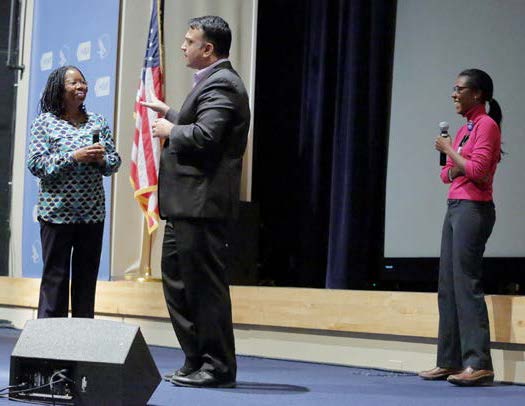Motivational speaker showcases importance of improvising, adapting and innovating at work

On Dec. 3, 2016, energetic and lively public speaker Avish Parashar gave a seminar, "Improvise, Adapt, and Innovate in an Ever-Changing World," to a captive NIH audience at the Clinical Center. Designed to help people practice making better decisions when faced with the unexpected, the talk combined audience participation, humor and improv comedy games to underscore three important response levels – improvising, adapting and innovating – when the unexpected occurs.
"Anyone can do great things when all goes according to plan. Your value to your organization is how you respond when things don't go according to plan," Parashar said. To begin, he had audience members demonstrate how to think fast when you hear a "ding" from a bell. In this game, participants were asked to have a conversation without using any words containing the letter "s." When an "s" was used, Parashar would ding a bell and the audience member would have to temporarily step out of the game. As one can imagine, the bell was dinged many times, but participants did manage to have a coherent conversation by thinking fast on their feet. This game set the stage for Parashar's talk on the three levels of response that he believes are critical to move forward positively in fluid situations.
Improvising: The first level of response, he explained, is improvising. At this level, it's about reacting with a mindset that increases your ability to be creative. When you hear a "ding," according to Parashar, your mindset should be "have fun, be willing to fail and focus on what you can control." He used an audience participant to demonstrate how a person afraid of failing is actually more likely to fail. "Fear of failure cuts you off from creativity when you need it the most," Parashar advised.
Adapting: The second level of response is adapting. The central goal of adapting is to make the new reality better than the old reality. "When you are faced with a 'ding moment,' how can you look better, not back?" Parashar asked the audience. He challenged audience members to recognize strengths in new situations – whether it's new supervisors, departmental structures, or technologies. Maintaining business as usual when change occurs is ineffective, Parashar asserts, and that mindset leads to failure.
Innovation: The third response level is innovation, and this is the most empowering of all three response levels. "You don't need to wait for bad things to happen, you can change the game pre-emptively, or create your own 'ding moments'," explained Parashar. "Often, people think the answer is to work longer or put more money into a problem, when people can simply change the game to propel them forward." At this level it's critical to say "Yes, and" instead of "Yes, but." Parashar used audience members to demonstrate how situations change drastically when you respond with "Yes, and" to colleagues. According to Parashar, this simple "and" versus "but" allows you to dig deeper and find new solutions to problems. "When we say 'Yes, and' we agree to step to the edge and even a little over it. That's critical for innovation. The 'Yes, and' is the engine that drives innovation. Explore the ideas that at first don't seem viable by using this phrase," Parashar concluded.
He closed with a personal anecdote about a family friend treated at the Clinical Center. He described what a big difference the organization has made in the patient's life and the lives of her family members, reminding all of us that our work truly does make a difference.
The lecture was a part of the Deputy Director for Management Seminar series which offers the NIH community engaging presentations that provide meaningful insights into leadership and management concepts, challenges and solutions.